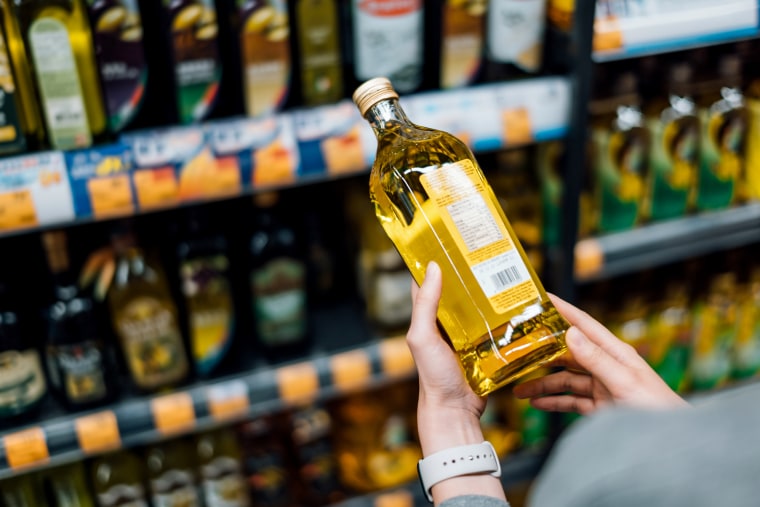Olive oil is one of the most nutrient-dense and disease-fighting foods on the planet. It’s considered a healthy monounsaturated fat with multiple bioactive compounds. These compounds lead to a high amount of polyphenols and potent antioxidant activity. However, with so many options to choose from at the grocery store, knowing which one is best for your shopping cart and your health can be unclear.
Regularly consuming extra virgin olive oil may lead to multiple health benefits:
1. Extra virgin olive oil may reduce the risk of dying from a disease.
A 2022 study in the Journal of the American College of Cardiology found that consuming ½ of a tablespoon or more daily reduced mortality risk from neurodegenerative disease, heart disease, respiratory disease, and cancer.
2. Extra virgin olive oil is a super fuel for the brain.
A study from Temple University found that when mice consumed a diet enhanced with extra virgin olive oil, they performed better on memory and learning tests and had better synaptic connections between neurons in the brain. Other studies show similar benefits to brain health.
3. Extra virgin olive oil is the enemy of chronic inflammation.
A recent meta-analysis of randomized controlled trials assessed the effect of regular dietary intake of olive oil on three inflammatory markers: C-reactive protein, interleukin-6, and tumor necrosis factor-alpha. All three features were improved with regular extra virgin olive oil consumption. Further, two studies found similar mechanisms in extra virgin olive oil and ibuprofen. A study in the Journal of Neuroscience found that a compound in extra virgin olive oil called oleocanthal was responsible for both anti-inflammatory benefits and the pungency that often leads to coughing when consuming sources with high phenolic compounds. Another study also indicated oleocanthal’s role as a potent anti-inflammatory. These studies identify olive oil as a natural source of NSAIDs which may be a treatment option for chronic inflammatory diseases.
4. Extra virgin olive oil may play a role in reducing the risk of cancer.
Multiple studies show that the same compound found to reduce inflammation may also play a role in the death of cancer cells.

How to choose the best olive oil
The olive oil industry is not one without controversy, and not all olive oils are created equal. Studies have shown that some olive oils may be adulterated with other oils, leading to the theory that a large percentage of olive oils are fake. A 2020 study broke down essential components of quality olive oil: “It has to be obtained using exclusively mechanical procedures, its free acidity cannot be greater than 0.8%, it must not show sensory defects, and it has to possess a fruity taste.”
How do these guidelines translate to the grocery store aisle? Here are a few tips on purchasing the highest quality olive oil.
- Opt only for extra virgin. Look for labels that identify the oil as “extra virgin.” This means that the olive has not gone through any chemical processing to extract the oil. The Extra virgin label also implies that the olive has been pressed without heat (or, first, cold pressed).
- Choose options revealing the harvest date. Though not required, the harvest date will give you a lot of information regarding freshness and quality. Most oils will also have a “use by” or a “best by” (for unopened bottles) date as well which will provide guidance based on when the oil was bottled. However, only the harvest date will indicate when the olives were removed from the olive trees and harvested. Early or first harvest means that the olives were pressed before ripening. Though often the most expensive, an early or first harvest produces the best tasting and highest nutritional quality option.
- Be choosy about where your olives come from. Country or origin indicates where the olives were harvested. It will also show you if the olives were derived from a single place or from multiple locations. Choose oils where only one country of origin is provided. This ensures that all processes from harvesting, to pressing to bottling occur in one place.
The bottle and timing of use matter in retaining quality
Light, heat, and oxygen will degrade taste and quality. Darkly colored glass bottles (or bottles with UV-protected glass), metal or opaque tins, ceramic bottles with dispensers, or stainless steel are all suitable options to keep quality contained.
Since all fats goes rancid, you should consider the clock ticking once you expose olive oil to air, heat, or light. For these reasons, you’ll want to consume within a few months and purchase your oil within 18 months of the harvest date. The fresher the oil (which may be indicated by the harvest date), the more polyphenol activity.
What can consumers look for to guarantee the quality?
Certifications are voluntary but may help ensure that the olive oil has the highest quality in harvesting and processing. The California Olive Oil Council, The North American Olive Association have quality certifications. You may additionally look for labels that indicate the mill or estate as well. Many small mills and estates will provide ample information on their websites on their individual process to ensure quality.
How to use olive oil
Studies show that consuming at least ½ tablespoon to 4 tablespoons daily is the key to living longer. More of it will likely produce more significant benefits. Olive oil can be used as a drizzle over vegetables or toast or as a finisher to a grain dish. It’s often utilized in whole grain or bean-based pasta as well. Cooking with olive oil is a great way to increase nutrient density and enhance flavor. Sauté plant and animal proteins or even utilize in chocolate making and baking. You can even drink a spoonful of it on its own.
Olive oil may help you live longer. It’s easy to incorporate it a healthy diet, now you have the tools necessary to choose the best options.